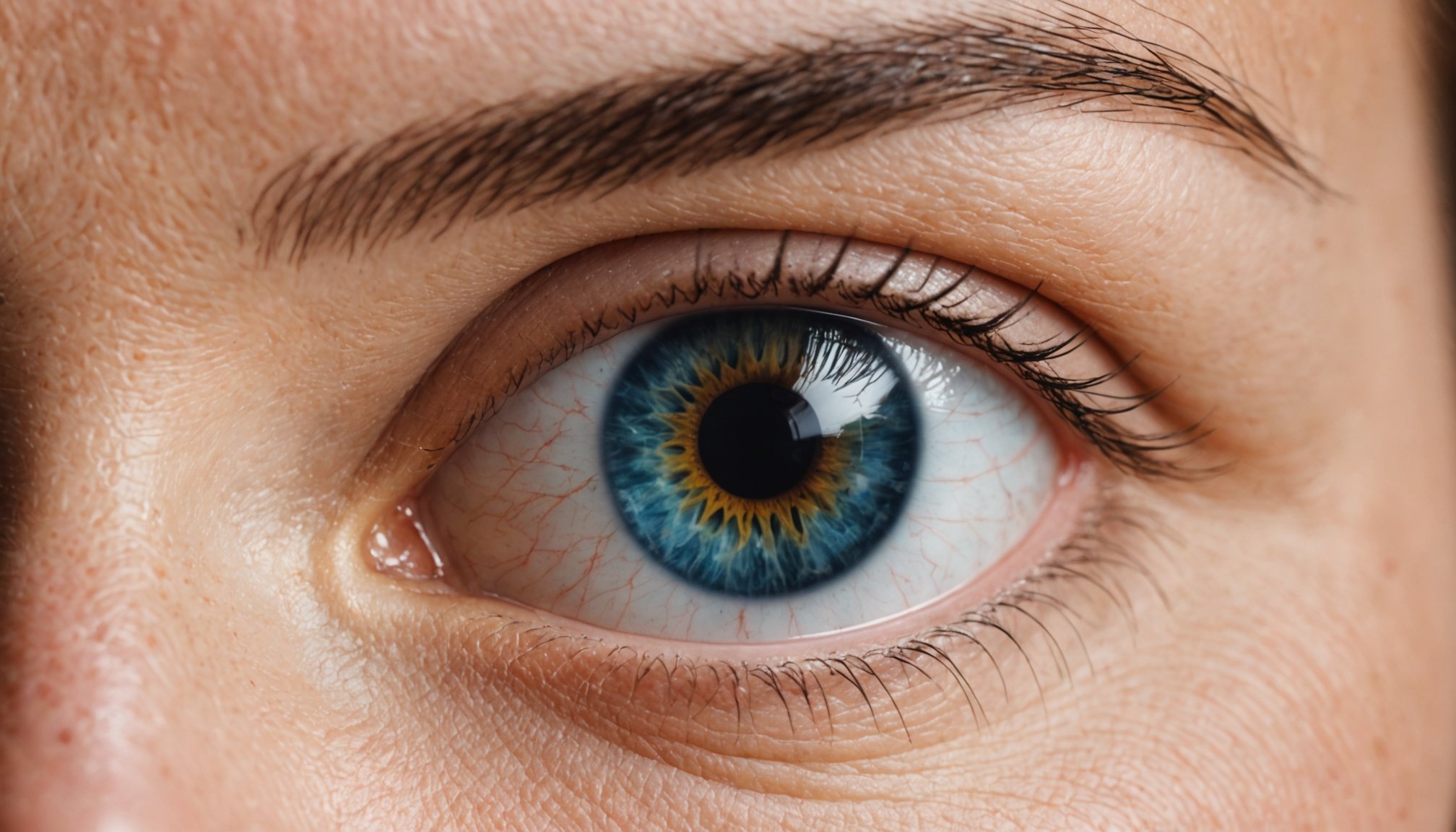Understanding Sensitive Eyes
Sensitive eyes can be uncomfortable and often require special attention to maintain comfort and health. Several common causes contribute to eye sensitivity, including environmental factors like allergens and dust, as well as prolonged screen exposure. Understanding these irritation causes is essential in eye care.
Eye sensitivity can manifest in various ways, from mild discomfort to more severe symptoms like redness, itching, or watering. It’s essential to distinguish between general eye sensitivity and specific conditions that might require more specific treatment, such as allergies or dry eye syndrome. These irritation causes often overlap, making it crucial to identify and address the root cause effectively.
Topic to read : Unlock the Power of Adaptogens: Discover the Top Benefits of Incorporating Them into Your Daily Diet!
Certain signs can indicate that your eyes are sensitive. Common signs include frequent tearing, inability to tolerate contact lenses, sensitivity to light, or even headaches and fatigue after tasks involving visual focus. Addressing these symptoms through appropriate eye care measures can significantly improve comfort.
Taking proactive steps can help manage and soothe sensitive eyes. Regular eyewear check-ups, using lubricating eye drops, and limiting screen exposure are beneficial habits. By recognizing early signs and seeking professional advice when needed, individuals with sensitive eyes can find relief and improve their overall eye health.
Additional reading : Exploring the Advantages of Incorporating Natural Materials in Your Home Décor
Daily Care Techniques for Sensitive Eyes
Maintaining a daily eye care routine is essential for individuals with sensitive eyes to prevent irritation and discomfort. Incorporating gentle techniques can significantly improve your eye health.
Routine adjustments are important. Start your day by gently washing your face with a hypoallergenic cleanser. Using cold water can help reduce puffiness and soothe irritation. Pat your face dry using a clean, soft towel to avoid any abrasive contact with your sensitive skin.
To further protect your eyes, consider incorporating protective eyewear into your daily life. This means wearing sunglasses with UV protection whenever exposed to sunlight. Investing in a pair with labels indicating 100% UV protection is optimum. If you work in environments with bright lights or screens, consider using glasses designed to filter out harmful blue light.
When cleansing your eyes, avoid rubbing them aggressively. Use a soft cotton pad to gently clean the area around the eyes. For those who wear makeup, choose products specially formulated for sensitive eyes and ensure thorough removal before bed.
Keeping these routine adjustments in mind can help alleviate common issues related to sensitive eyes, providing you with comfort and better eye health. Consider consulting an eye care professional for more personalized recommendations.
Recommended Hypoallergenic Products
For individuals with sensitive eyes or skin, choosing the right hypoallergenic products is crucial in preventing irritation and discomfort. The availability of products such as eye drops and skincare items tailored for sensitivity is extensive, catering to diverse needs and preferences.
Best Eye Drops for Sensitive Eyes
When searching for the best eye drops for sensitive eyes, opt for those specifically labeled as hypoallergenic. These products are designed to minimize allergens and reduce tear film instability, preventing irritation. Ingredients to prioritize include lubricants like glycerin or hyaluronic acid, which are known for their soothing qualities. Brands such as Systane Ultra and Blink Tears offer reputable options.
Gentle Cleansers for Eye Area
The eye area is one of the most sensitive parts of your face, and using gentle cleansers is imperative. Cleansers with minimal ingredients and free from fragrances and dyes are ideal. Look for key components such as chamomile and aloe vera, both renowned for their calming effect on the skin. Brands like Cetaphil and La Roche-Posay often receive high praise for their mild formulations.
Safe Makeup Options
Choosing the right makeup is just as important. Seek out safe makeup options that contain fewer irritants and are labeled as hypoallergenic. Brands like Almay and Clinique offer products with robust hypoallergenic certifications, enhancing their trustworthiness. These items typically exclude parabens and sulfates, which can trigger reactions.
Common Irritants to Avoid
Sensitive eyes can be greatly affected by various irritants. In homes, everyday substances such as dust, pet dander, and smoke are prominent culprits. These allergens can lead to discomfort, itching, and redness, turning peaceful environments into constant sources of irritation. Regular cleaning and controlled ventilation can mitigate their impact.
Environmental factors play a significant role as well. Seasonal allergies, for instance, arise from pollen that can overwhelm the eyes. Detecting these seasonal patterns is beneficial. Identifying personal triggers aids in preparation, which can involve visiting local allergen alerts or consulting healthcare providers.
Moreover, air quality is crucial. Poor air quality, laden with pollutants, exacerbates existing irritations. Incorporating air purifiers at home aids significantly, removing potential irritants from the atmosphere.
Maintaining optimal moisture levels in the air is equally important. Dry environments can lead to dehydrated eyes, causing stinging and burning sensations. Using humidifiers ensures adequate moisture, soothing symptoms. Seeking professional advice on maintaining proper hydration and avoiding specific irritants is an advisable step towards achieving eye comfort and health.
By understanding and addressing these various elements, those with sensitive eyes can enhance their quality of life substantially.
Strategies for Prevention
Maintaining eye health is crucial, particularly for individuals with sensitive eyes. Regular eye exams are instrumental in identifying potential issues early and ensuring effective prevention strategies. By seeing an eye specialist routinely, you can track any changes and get personalized advice. These exams are not just for vision correction; they also help in detecting underlying eye conditions that might require immediate attention.
Incorporating thoughtful lifestyle adjustments can significantly benefit those with sensitive eyes. A balanced diet rich in nutrients like Omega-3 fatty acids and Vitamin A supports overall eye health. Hydration also plays a key role—drinking sufficient water helps maintain ocular moisture, which is essential for comfort, especially in dry or windy conditions.
Creating a supportive environment for sensitive eyes involves reducing exposure to potential irritants. This could mean using air filters to reduce allergens indoors or wearing sunglasses to shield your eyes from harsh sunlight. Additionally, taking regular breaks when using digital screens can prevent eye strain and fatigue.
Defending against eye discomfort doesn’t only revolve around treating symptoms. A proactive approach with prevention strategies ensures long-term eye wellness. Emphasizing regular check-ups, making dietary changes, and creating a nurturing environment are pivotal steps in this journey.
Expert Insights and Testimonials
Understanding how to care for sensitive eyes requires reliable expert advice and personal experiences that resonate with your situation. Ophthalmologists, revered for their expertise, shed light on managing this delicate issue. They emphasize the importance of using eye care specialists to guide the selection of hypoallergenic products and prescribe treatments that align with individual sensitivities.
Ophthalmologists typically recommend maintaining a consistent routine that incorporates gentle products designed specifically for sensitive eyes. This often includes avoiding irritants such as certain ingredients in cosmetics, environmental pollutants, and spending too long in front of digital screens. They also often advise regular consultations with eye care specialists, which are paramount for monitoring ongoing conditions and adapting care strategies accordingly.
Valuable insights can also come from testimonials of individuals who have their own stories of overcoming eye sensitivity. For instance, many have found success in implementing strategies such as consistent hydration, using specialized eyewear, and adhering to eye-friendly diets. These firsthand accounts highlight the significance of personalized care and perseverance in achieving comfort and health.
Discovering recommended resources for ongoing eye health education can further empower you. Relying on professional platforms and scholarly articles ensures that your information remains current and scientifically supported, enhancing your understanding of managing sensitive eyes effectively.











